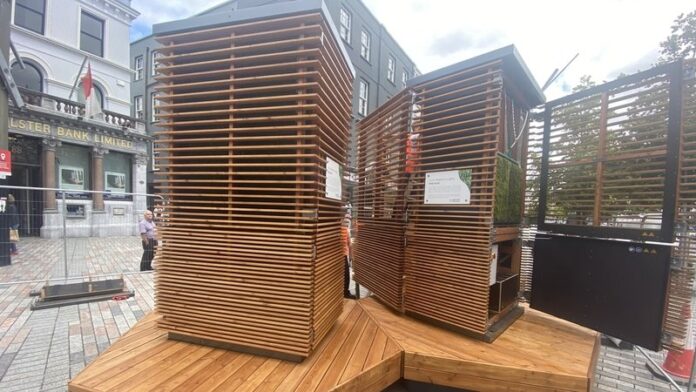
The installation and cost of so-called ‘robot trees’ in Cork city centre has been defended by the City Council who say it is part of a broader programme to tackle air pollution.
Installation of the five high-tech CityTrees is under way at St Patrick Street and on the Grand Parade.
The city’s Green Party councillors have welcomed the initiative, but critics accused the local authority of nothing more than ‘green-washing’ or misleading the public.
According to the Environmental Protection Agency, air pollution is responsible for up to 1,300 deaths in Ireland each year.
Costing €350,000 and maintenance for the year, the CityTrees are 4 metre wooden structures, covered in mosses designed to filter harmful pollutants, such as fine dust particles and nitrogen oxides (NOx), from the air.
The moss acts as a filter to ‘trap’ and ‘eat’ fine dust, making it a sustainable and regenerative fine dust filter.
The City Council says scientific studies show the CityTrees – which have also been installed in other European cities such as London and Berlin – can clean about 80% of fine dust in the immediate vicinity.
The CityTrees also have in-built sensors to collate air quality data for analysis, and 40-inch TV screens to share information about air quality in the city, as well as in-built public seating.
David Joyce, Cork City Council’s Director of Operations has defended the cost and the installation of the CityTrees.
He said that they work as a compliment to trees, not a replacement for them and unlike trees which do very little to combat air pollution caused by fine dust, these mosses can filter and digest it in a natural way.
“The CityTrees provide a site-specific solution to the challenge of air pollution and are one of a suite of actions in Cork’s Air Quality Strategy. Air pollution is a public health concern and Cork City Council is the first local authority in the country to progress such a strategy,” he said.
Mr Joyce added that the City Council has planted over 1,300 trees in the past year, and a Tree Officer for the city has been appointed.
But atmospheric scientist Dean Venables, a researcher at the Centre for Research into Atmospheric Chemistry at UCC, is critical of the costs to the taxpayer and the effectiveness of the project.
He said that while the CityTrees may clean the air in the immediate vicinity of the constructions, they would have no discernible impact on overall air quality in the city.
“I like that Cork City Council are trying to do something innovative in terms of air quality and that air quality is on the agenda for the Council,” he said.
“I don’t like these trees because they are trying to remove pollutants and that’s not going to be an effective approach.
“In terms of air quality what we really have to do is remove pollution at its source.”
Green Party Cork City Councillor Dan Boyle has welcomed the new infrastructure, but said “whether it is something that will be publicly identified and accepted, we will have to see, but I think the job it seeks to do is a job that needs to be done.”
The project is one of 500 such projects in 11 counties funded by the Government in its July stimulus plan in response to the Covid-19 crisis.




